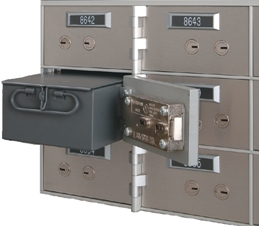How to Access a Deceased Person’s Safe Deposit Box in Texas?
 Many people store important papers such as life insurance policies, wills and other important documents in safe deposit boxes to keep them secure. When they die, the personal representatives of their estates need to access the safe deposit boxes to retrieve these documents.
Many people store important papers such as life insurance policies, wills and other important documents in safe deposit boxes to keep them secure. When they die, the personal representatives of their estates need to access the safe deposit boxes to retrieve these documents.
Texas’ probate statutes provide a means of gaining access to the safe deposit box with and without court order.
Access to Safe Deposit Box with Court Order
A judge that has probate jurisdiction over a decedent’s estate may order a bank to allow a court representative to inspect the safe deposit box if it appears that the bank leased a safe deposit box to the decedent, and the safe deposit box may contain a will, deed to a burial plot, or an insurance policy.
If the court issues an order, the court representative can examine the decedent’s safe deposit box in the presence of the judge ordering the examination and a representative of a bank that leased the safe deposit box.
The judge can order the bank that leases the safe deposit box to give the court representative a will, a deed to a burial plot, or an insurance policy issued in the decedent’s name. It is then incumbent on the court representative to deliver:
- The will to the clerk of the court that has probate jurisdiction
- The burial plot deed to the person designated by the judge in the order for examination, and
- The insurance policy to a beneficiary of the policy
Access to Safe Deposit Box without Court Order
It is not always necessary to seek a court order to inspect the contents of a safe deposit box. A bank who leases a safe deposit box to a deceased person may permit any of the following people to examine the contents of the safe deposit box in the presence of a bank representative:
- The decedent’s spouse
- The parent of the decedent
- A descendant, such as a child or grandchild, of the decedent who is at least 18 years
- A person named as an executor of an estate in a copy of a document that appears to be the decedent’s last will and testament
The person inspecting the contents of the safe deposit box can request that certain documents be delivered to certain designated individuals. The bank who leases the safe deposit box may deliver:
- A document appearing to be the decedent’s last will to the clerk of the court that has probate jurisdiction or to the person named in the document as executor of the estate
- A document appearing to be a deed to a burial plot or appearing to give burial instructions to the person making the examination
- A life insurance policy to the beneficiary named in the policy
If a bank allows access to the safe deposit box without court order, it must keep a copy of a document that appears to be the will for four years after it delivered it.


Comments